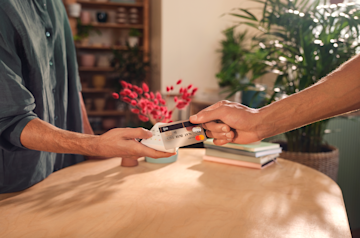
Minimalism: How a simpler lifestyle can help you save money
If you want to reduce your cost of living and improve your peace of mind, a minimalist lifestyle might be right for you. Learn what that looks like and how minimalism can help you save money!
6 min read
From light, muted colors to clean lines and empty space, minimalism has certainly made a mark on the design and decorating world. But the “less-is-more” principle can also be applied to many different parts of life. Living frugally isn’t just about reducing your expenses and impact, but also planning for your future. So, what exactly does a minimalist, cost-cutting lifestyle look like — and why do people go for it? And what can the average person do to live more frugally and work toward their financial goals? Here, find answers to these questions and much more.Minimalism is more than just a trend — for some, it’s a way of life. Minimalist living could mean having very little furniture and plenty of open space in your home. Others take the concept even further, opting for an alternative living concept or becoming a digital nomad. Regardless, people who adopt a minimalist lifestyle are usually also frugal and thrifty. Instead of spending money on stuff, they may opt to put it into stocks or other investments. Living minimally is all about owning less, and therefore buying yourself more financial freedom. Rather than constantly consuming, those who hop on the minimalism trend are usually trying to live by their principles, like spending more time in nature or connecting with their friends — or venturing out of the corporate world and into freelance work. A third pair of sneakers, a vintage bottle of wine, a new speaker — every time we buy something, we inject our hard-earned cash back into the economy. It’s fair to say that modern society depends on us continuing to spend. But this also has a price: The environment is buckling under the weight of our consumption, and there’s a general sense of malaise and dissatisfaction spreading across even the wealthiest parts of the world. After all, the buzz you get from a new purchase only lasts so long. To try to exit this vicious cycle, many folks have decided to embrace minimalist living. They want to preserve resources, focus on the essentials, and consume consciously. This can mean avoiding fast fashion and instead going for high-quality items that are made to last. Or, people might choose to spend on experiences rather than things — like a bike trip through Europe, a visit to an art exhibition, or a workshop on how to grow your own vegetables. Others might live hyper-frugally and save as much money as possible in a short amount of time to try to retire early. The answer is pretty straightforward: The less you buy, the more money you save. However, minimalism isn’t necessarily cheaper — it depends on your taste and values. If you decorate your apartment with a tiny selection of handmade designer objects or only shop for organic food, you’ll probably spend a lot more than if you buy second-hand furniture and bulk discount produce. Whatever your taste, minimalism offers ample opportunities to save, especially on resources. For example, you can reduce your electricity bill by unplugging your appliances when you’re not using them. Instead of pouring cooking water down the drain, let it cool and use it to water your plants — it’s a great way to save on your water bill and help the environment. And do you really need to pay for colorful Post-it notes, or can you write your to-do lists on scrap paper or old envelopes? Minimalism doesn’t mean you have to overhaul your entire life. It’s more about creating space for the things that are most important to you. Think about where you can start cutting back, and bit by bit, minimalism will start to seep into parts of your life where you didn’t expect it. With so many delivery services, restaurants, and ready-made products, it’s easy to avoid cooking at home. But when you prepare your own food, you’ll reduce food waste, save on packaging, and save money. Plus, you have the chance to get creative and try out new dishes! Before you head to the supermarket, create a meal plan and a shopping list so that you don’t end up buying items you don’t need. This way, you’ll reduce waste and save yourself the stress of trying to use items before they go bad. Cooking for yourself can have other benefits, too. Following a vegan diet and foregoing animal by-products not only saves you money, it’s good for animals and for the planet.The most well-known minimalism tip is to clean up your living space. Whether you want to try the Marie Kondo method or choose your own decluttering system, putting things in order can be extremely satisfying. Here are some major categories where you can start sorting: Minimalism and frugality aren’t only great ways to reduce your consumption, they can also help you improve your work-life balance. If you’re working long hours in the office or frantically searching for new freelance gigs, living minimally can help you get back to basics. Think about how you can reduce your working hours and find more space in your weekly routine. For example, why not spend your lunch break in the park or a cafe instead of at your desk? Experts agree that you should take breaks during the day to avoid overworking yourself. You might also want to test out some project management tools to improve your efficiency. Use your newfound time to relax, work on personal projects, or try out a new hobby.If you’re tired of sitting in traffic or looking for a parking place, why not use another form of transport, such as public transit, walking, or cycling? Reducing your car use is better for the planet, your wallet, and your health. If you live in a rural area and need a car to get around, try carpooling with your neighbors to school or for shopping trips. You’ll save time and money and strengthen your ties to your community.Did you know that there are plenty of digital tools that can help you lead a more minimal lifestyle? With a mobile bank account at N26, you can save yourself the paperwork and make transfers on your smartphone in seconds. Our smart Insights feature lets you keep an eye on your spending and track how your new minimalist lifestyle impacts your finances. As a premium customer, you can easily move your savings to one of 10 Spaces sub-accounts. These virtual piggy banks sit right alongside your main account, helping you save for the goals that matter most to you. Why wait? Check out our accounts today and find the one that’s right for you.
What is minimalism?
The advantages of minimalist living
Is it cheaper to be a minimalist?
How to get started with a minimalist lifestyle
Cook at home
Declutter your apartment
- Clothes, underwear, and socks
- Shoes, scarves, hats, and gloves
- Jewelry and accessories
- Bags, backpacks, and cosmetic bags
- Makeup and toiletries
- Towels and washcloths
- Dishes and silverware
- Kitchen appliances
- Books and magazines
- CDs and DVDs
- Cables and technical equipment
- Tools
- Decorations
- Papers, schoolwork, and files
Find a better work-life balance
Leave your car at home
Mobile banking, built with you in mind.
Find similar stories
BY N26Love your bank
Related Post
These might also interest youLIFESTYLECould AI help you manage your money?86% of people are open to using AI for financial planning, but is it safe? Learn how AI is already transforming money management, and discover the pros and cons.
4 min read
LIFESTYLEUnderstanding tariffsFrom higher grocery bills, pricier electronics, and stock market swings, tariffs can impact your wallet and your investments.
5 min read
LIFESTYLEDe-hyping the no-spend challengeThis extreme challenge promises to transform your finances, but is it really the game-changer it claims to be?
4 min read


